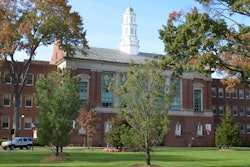The UNCF/MERCK Science Initiative (UMSI) announced on Monday that it is awarding 37 scholarships and fellowships to African-American students in biological science and engineering disciplines.
Since 1995, the United Negro College Fund (UNCF) and Merck, one of the largest pharmaceutical companies in the world, have partnered to award scholarships and fellowships to 627 undergraduate, graduate, and postdoctoral students, as a means to address a national problem of the underrepresentation of African-Americans in STEM (Science, Technology, Engineering, and Math).
According to the National Science Board’s report “Science and Engineering Indicators 2012,” U.S. undergraduates are pursuing degrees in the STEM disciplines at a significantly lower rate than in other countries. Only 16 percent of U.S. undergraduates graduate with a natural science and engineering degree, compared to 24 percent in the EU and 44 percent in China.
Dr. Karl Reid, UNCF senior vice president of Academic Programs and Strategic Initiatives, described the STEM gap as “a huge problem.” Citing Georgetown University’s Center on Education and the Workforce STEM report, he explained that around 80 percent of the U.S. economy is driven by technology innovation, while STEM workers hold just 4.4 percent of jobs in the U.S. economy.
“We need an educated workforce to have a full effect and to continue to lead the global economy,” Reid said.
Compounding this problem is that, of those graduating with a degree in a STEM major, only about half are working in STEM after college, and even fewer are working in STEM after 10 years.
Dr. Tshaka Cunningham, UNCF Merck Fellow alumni, explained that training in STEM disciplines teaches students to become problem solvers. As a result, a vast number of jobs, not necessarily in the STEM fields, are available to graduates. In many cases, these non-STEM jobs offer a higher salary. However, he explained that UMSI works to address this by having awards at the graduate and post-doctorate level, the levels at which many tend to leave the field.
Reid added that the mission of the initiative is “to provide African-American students and scholars with financial resources, research and academic experiences that support their training and development.” Although the monetary grants given to these students are significant, the impact of the initiative goes beyond their research.
The initiative has created “a community unlike any other in the world. It’s a source for me and many others of relationships with our peers. It continues to embolden us and encourage us to persist in our careers,” said Cunningham.
In fact, in 2007, more than 200 of the UMSI fellows established the Association of Underrepresented Minority Fellows (AUNF), which has built a network to sustain a pipeline of underrepresented minority biomedical scientists in the workforce. In addition, AUNF is interested in addressing larger policy issues regarding STEM, especially in K-12 education.
Reid emphasized that, to address the problems students face when pursuing STEM disciplines, it is critical for young people to be put on the right path early on. He explained that African-Americans are underrepresented in the STEM disciplines largely because of an education disparity. He said that “those who need the exposure [to STEM] and rigorous education the most, given the changing demographics, are not getting it.”
In addition, Reid advocated for programs that address three major needs as a student enters college: an attitudinal shift, a connectional shift, and a behavioral shift.
An attitudinal shift involves establishing support structures to empower students as the difficulty and rigor of math and science can be much more immersive and overwhelming than subjects that can be eased into, such as English or sociology, he said. The connectional shift refers to creating connections to find peer mentors and faculty mentors.
Finally, according to Reid, a behavioral shift involves a change in mindset regarding studying. Although many students can get away with limited studying in high school, college classes require much more effort and preparation. Reid explained that summer bridge programs can greatly facilitate these necessary shifts and that the AUMF is working hard to intervene as early as possible in a student’s life.
Reid explained that “the work USMI and AUMF do is comprehensive, but we need to do a whole lot more.”
“Fortunately,” he added, “we’re well positioned to do that because of the platform that this UNCF/Merck Science Initiative has created.”


















